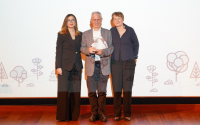Common Dreams / Published on Saturday, December 17, 2005 by Inter Press Service
World Trade Organisation (WTO) officials released a draft text Saturday of the meeting's final outcome pact, although disagreements among the group's 149 member countries -- most sharply between the richest and poorest -- could still scuttle the document.
 Anti-WTO protesters sleep in the middle of the raod as they occupied a downtown street near the Hong Kong Convention and Exhibition Center early Sunday, Dec 18, 2005. Hundreds of protesters broke through police lines and came close to storming into the WTO's meeting venue before staging a sit-in for several hours. (AP Photo/David Guttenfelder) Anti-WTO protesters sleep in the middle of the raod as they occupied a downtown street near the Hong Kong Convention and Exhibition Center early Sunday, Dec 18, 2005. Hundreds of protesters broke through police lines and came close to storming into the WTO's meeting venue before staging a sit-in for several hours. (AP Photo/David Guttenfelder) |
However, the trade in services like telecommunications, insurance and banking is another key area of the negotiations. It has been bogged down because many developing countries -- led by the G90 group -- are resisting pressure to open their nascent markets to powerful multinational companies.
Services account for about 70 percent of the global economy, but only about 20 percent of world trade because of limits on foreign ownership and other barriers to firms seeking to enter new markets.
Under the current regime, countries are free to decide what sectors to liberalise and when. However, the draft text being pushed by wealthy nations would remove much of this flexibility.
Focus on the Global South, a project of development policy research, analysis and activism, was founded in 1995. It has offices in Bangkok, Thailand; Mumbai, India; and Manila, Philippines.
IPS spoke to Aileen Kwa of Focus on the Global South about her perspectives on the 44-page draft.
Q: Do you consider the draft declaration of the WTO that came out today a step forward or backward for poor nations?
A: I think it is a step backward for the developing world if they agree to it because it is asking them to open up their markets radically [not only] for industrial products but also services.
Q: But hasn't that been the position of developed nations all along?
A: That's what they publicly said they want. But the developing countries were protected by the flexibilities in the GATT (General Agreement on Tariffs and Trade) agreement, which said that we only open up if it is in our national interest.
But this text is launching very ambitious sectoral negotiations, or what they call pluri-lateral negotiations, where the U.S. and EU [European Union], especially, want to repeat what they did at the end of the Uruguay Round. They had certain sectoral negotiations in telecommunications and in finance then, but now in this round they want a lot more. They want it in energy distribution, in legal services, almost everything.
Q: Do you think that any of the demands of the poor countries have been met in the draft of the final declaration?
A: Very minutely. The developing countries made it clear that they didn't want Annex C (trade in services) or they want an alternative Annex C that would allow them to keep their flexibility. Their position has got shoved aside because this text doesn't take into account what they put forward in the alternative text.
Q: Do you think developing countries will be able to hold their ground?
A: There is a lot of political pressure, immense political pressure in fact on the developing countries. There will be calls from Washington to presidents and ministers to tell them to shut up. And there are countries that have been shutting up in the green room (where negotiations take place at WTO meetings). But the question is whether they will still band together.
This morning in the Africa group meeting, the Africans said we reject this annex. I think there is some possibility they will continue their opposition because it is such a radical change.
Q: Are you disappointed by the text or by the poor countries' silence over the final declaration?
A: I am disappointed by the behaviour of the developed countries. It is a very difficult situation for poor nations. Some of them rely on developed countries for large amounts of aid for their budgets to be able to stand firm. There is little sovereignty. This is not of their doing. It's because of the whole history of economic relations.






